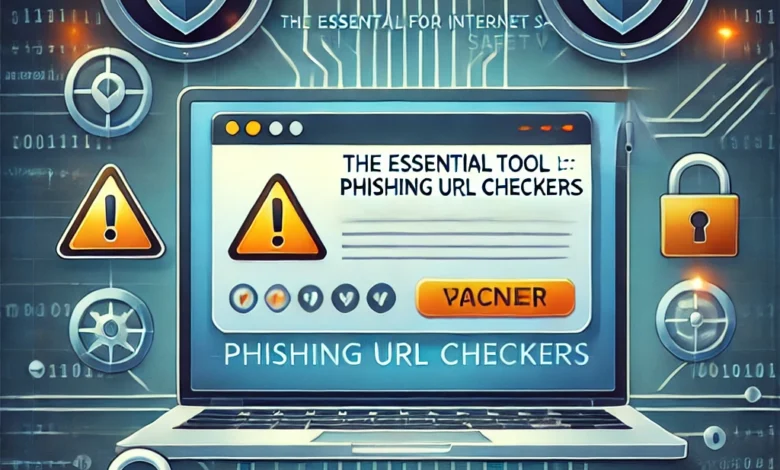The Essential Tool for Internet Safety: Phishing URL Checkers

In today’s digital age, where the internet serves as an indispensable tool for communication, commerce, and entertainment, ensuring our safety in the vast online landscape is paramount. With the ever-looming threat of cyber attacks, particularly phishing scams, users must arm themselves with effective safeguards. Among these, one essential tool stands out: the phishing URL checker.
Phishing remains one of the most prevalent and insidious forms of cybercrime. Through deceptive emails, messages, or websites, attackers aim to trick individuals into divulging sensitive information such as passwords, financial details, or personal data. These fraudulent attempts often appear legitimate, mimicking trusted sources like banks, social media platforms, or online retailers. Unwary users falling prey to phishing attacks can suffer significant consequences, including identity theft, financial loss, or malware infection.
Herein lies the crucial role of phishing URL checkers. These tools act as digital guardians, scrutinizing web addresses to identify signs of phishing activity. By analyzing various parameters, such as domain reputation, SSL certificates, and URL structure, they assess the legitimacy of a website and alert users to potential risks. Whether integrated into web browsers, security software, or available as standalone services, phishing URL checkers serve as frontline defenses against online fraud.
One of the primary methods employed by phishing URL checkers is assessing the authenticity of website domains. Legitimate websites often have established reputations built over time, reflected in factors such as domain age and historical activity. Conversely, phishing sites frequently use newly created domains or mimic popular ones with slight alterations, aiming to deceive unsuspecting visitors. Phishing URL checkers leverage domain analysis techniques to detect such anomalies, flagging suspicious URLs for further scrutiny.
Moreover, SSL (Secure Sockets Layer) certificates play a pivotal role in verifying the security of a website. These certificates encrypt data transmitted between a user’s browser and the website’s server, ensuring confidentiality and integrity. Legitimate websites typically possess valid SSL certificates, indicated by the presence of HTTPS in their URLs and visual cues like padlock icons. Phishing URL checkers meticulously examine SSL certificates, identifying inconsistencies or expired certificates that might indicate malicious intent.
Another crucial aspect evaluated by phishing URL checkers is the structure and content of URLs themselves. Phishing attacks often rely on deceptive URLs that mimic authentic ones to mislead users. These fraudulent URLs may contain subtle misspellings, extra subdomains, or unusual characters designed to evade detection. Phishing URL checkers employ pattern recognition algorithms and heuristic analysis to scrutinize URLs for such anomalies, helping users differentiate between genuine and malicious links.
Furthermore, phishing URL checkers leverage threat intelligence databases and machine learning algorithms to enhance their detection capabilities continuously. By analyzing vast datasets of known phishing URLs, these tools can identify emerging patterns and trends indicative of malicious activity. Machine learning algorithms further refine the detection process by adapting to evolving tactics used by cybercriminals, thereby staying ahead of emerging threats.
The effectiveness of phishing URL checkers extends beyond individual users to encompass organizations and enterprises. With businesses increasingly reliant on digital platforms for operations and communications, the risks posed by phishing attacks have far-reaching implications. A single successful phishing attack can compromise sensitive corporate data, disrupt business operations, and tarnish reputations. By deploying phishing URL checkers across their networks, organizations can fortify their defenses against cyber threats, safeguarding their assets and preserving trust among stakeholders.
Moreover, the proliferation of mobile devices has expanded the attack surface for phishing scams, necessitating robust protection measures. Phishing URL checkers designed for mobile platforms provide on-the-go security, empowering users to stay vigilant against fraudulent links while browsing on smartphones and tablets. With mobile phishing on the rise, especially through SMS messages and social media apps, these mobile-compatible checkers offer invaluable protection against a growing threat landscape.
Despite their effectiveness, phishing URL checkers are not infallible and should be complemented by user vigilance and awareness. Cybercriminals continuously refine their tactics, employing sophisticated techniques to evade detection. Users must remain cautious when interacting with online content, especially unsolicited emails, messages, or links. Educating users about the telltale signs of phishing, such as generic greetings, urgent requests for personal information, and suspicious URLs, remains essential in combating this pervasive threat.
In conclusion, in an era defined by pervasive digital connectivity, safeguarding our online experiences against phishing attacks is imperative. Phishing URL checkers stand as indispensable tools in this endeavor, offering real-time protection against fraudulent websites and links. By leveraging advanced techniques such as domain analysis, SSL certificate verification, and URL scrutiny, these checkers empower users to navigate the internet safely and confidently. As cyber threats continue to evolve, investing in robust security measures, including phishing URL checkers, remains paramount in safeguarding our digital lives.

